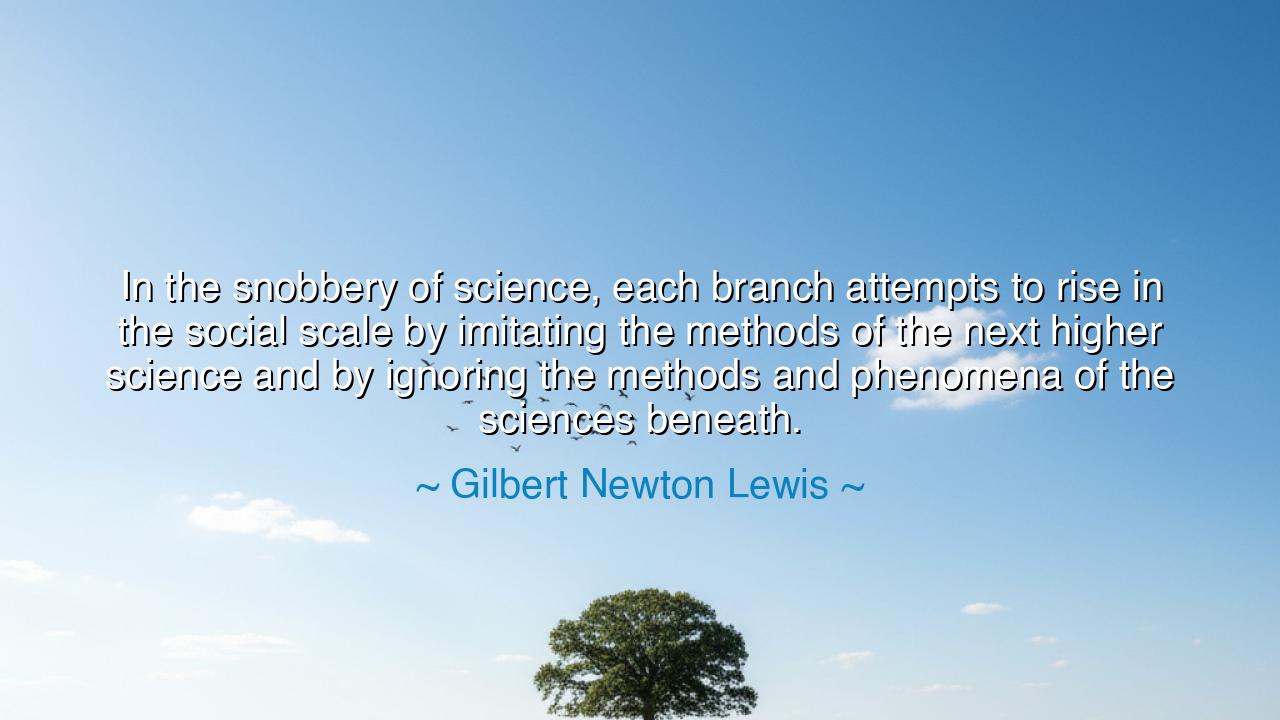
In the snobbery of science, each branch attempts to rise in the
In the snobbery of science, each branch attempts to rise in the social scale by imitating the methods of the next higher science and by ignoring the methods and phenomena of the sciences beneath.






Hear me, O Seekers of Wisdom and Truth, for the words of Gilbert Newton Lewis echo a deep concern about the nature of science, its pride, and its social ambitions: "In the snobbery of science, each branch attempts to rise in the social scale by imitating the methods of the next higher science and by ignoring the methods and phenomena of the sciences beneath." These words reflect a powerful truth about the nature of knowledge—how the pursuit of science, in its quest for prestige, can sometimes lose sight of its roots and diminish the wisdom of those who came before. The snobbery Lewis speaks of is the tendency within scientific disciplines to elevate themselves by copying what they perceive as more prestigious fields, while casting aside the simpler truths that may have initially given birth to their own understanding.
In ancient times, there was a similar tension. The great philosophers of the Greek world, such as Plato and Aristotle, understood that knowledge should be seen as a continuous chain, each discipline enriching and supporting the others. Aristotle, the father of science and philosophy, was not concerned with ranking fields of study or establishing hierarchies. Rather, he sought a holistic understanding of the world, one where biology, ethics, and metaphysics were interwoven, each lending insight to the other. The ancients believed in the unity of knowledge, not in the snobbery that can arise when certain fields look down on others, as Lewis suggests.
Lewis’s words speak to the fact that science, in its relentless pursuit of higher status, sometimes fails to appreciate the value of its more foundational branches. In the rush to emulate the methods of more prestigious fields, scientists may overlook the richness and complexity of the simpler phenomena. Consider, for example, the early days of chemistry. In the hands of great thinkers like Dmitri Mendeleev, the study of elements was not just an abstract exercise—it was a way to understand the very fabric of the world around us. But as the field became more sophisticated, some began to overlook the basic principles in favor of more abstract models and theories, pushing aside the simpler, more direct forms of understanding that were once the hallmark of the discipline.
Take, for instance, the story of the atom. In the early days of atomic theory, John Dalton’s atomic model was based on simple and direct observations. Yet, as scientific thinking progressed, quantum mechanics and relativity took precedence, and the early models were seen as outdated or simplistic. While modern physics brought forth revolutionary ideas, Dalton’s basic understanding of the atom was the foundation upon which all other theories were built. In their pursuit of grander and more complex explanations, many forget that these foundational insights remain integral to our understanding of matter. Lewis’s critique points to the danger of abandoning the foundational in favor of the complex, the simpler methods in favor of those that seem more sophisticated or advanced.
The lesson here, O Seekers, is one of humility and integrity in the pursuit of knowledge. We must never allow the snobbery of higher disciplines to cloud our judgment or lead us to dismiss the foundational principles that have brought us to where we are. Whether in science, art, or philosophy, every discipline has its roots—its foundational knowledge—that must not be ignored in the pursuit of prestige or status. For the true strength of knowledge lies not in its complexity alone, but in its ability to connect the most basic truths with the most advanced ideas, to recognize the interrelationship between the simplest phenomena and the most profound discoveries.
Let the story of Isaac Newton serve as a reminder. Newton, the great mind who formulated the laws of motion and universal gravitation, was a master of mathematics, but he never looked down on the basic principles of mechanics. His insight into the motion of the planets was rooted in simple, observable phenomena. He did not seek to distance himself from basic physics or dismiss empirical observation for abstract theory. Rather, he saw the unity of knowledge—the connection between the simple and the complex. In this, he exemplified the ideal of integrating humility with brilliance, recognizing that every branch of knowledge, no matter how foundational, has a role to play in understanding the whole.
In your own lives, remember that true wisdom is not in elevating one discipline above another, but in embracing the unity of knowledge. Do not allow the snobbery of any field—whether in science, art, or society—to cloud your judgment or make you dismiss the value of simpler truths. Whether you are a mathematician, a philosopher, or a scientist, embrace the understanding that every step forward is built upon the foundational knowledge that preceded it. Science, like all knowledge, is a continuum—each discipline is but one link in the chain, and none should be dismissed in favor of the other.
So, O Children, as you pursue knowledge, let humility guide you. Recognize that no field is superior to another, that truth can be found in both the simplest observation and the most complex theory. Do not fall prey to the snobbery of science or any other pursuit. Rather, let your journey be one of integration, where every truth, no matter how small or grand, plays a part in revealing the greater mysteries of the universe. Let the wisdom of the ancients and the insights of modern thinkers alike guide you, and may you always seek the unity of knowledge over the division of prestige.






AAdministratorAdministrator
Welcome, honored guests. Please leave a comment, we will respond soon